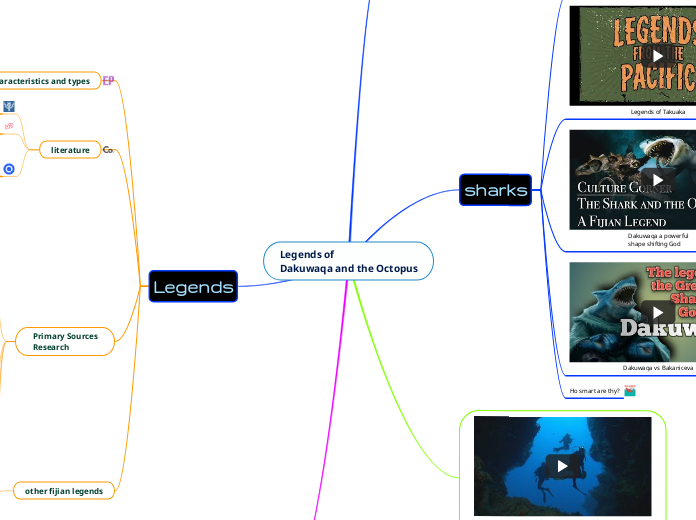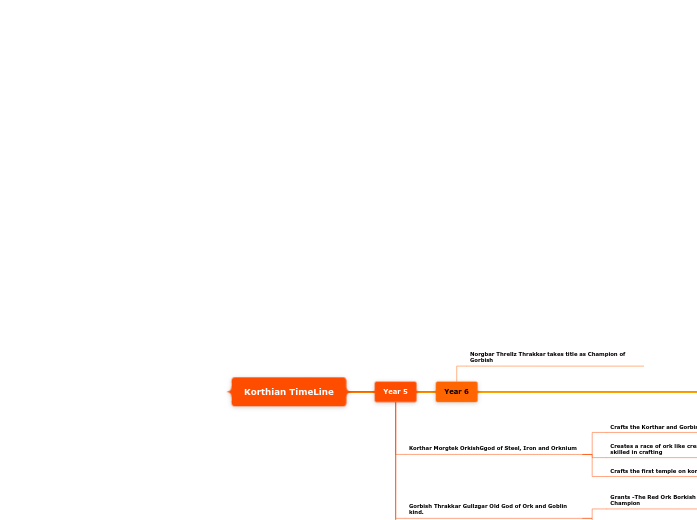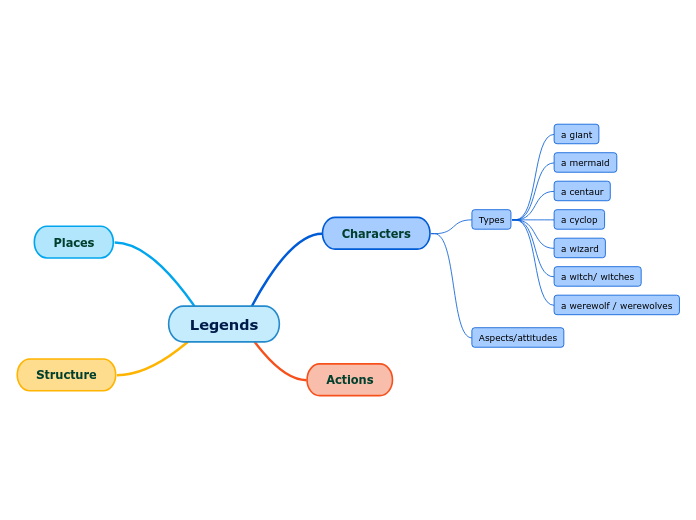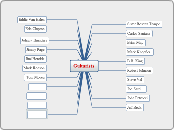Legends of
Dakuwaqa and the Octopus
Holz
Eichenholz
Legends
other fijian legends
Mana
Primary Sources
Research
The Kisra Legends
Modern Legends and Rumor
New legends Perspectives from Antrhopologies
what is legend?
expressive of symbolic responses to problems
of adaptation to the physical and social environment
plotted stories
supposedly true
anonymous
Apocryphals
Survey of Legend Theory and Character
approach prblem
literay approach and
disregarding
legends and folktales
folktales
inner reality
legends linked to outer reality
pp 373
Legends make specific references to geographical features or historical people that can be checked.
The story of the legend is built around a single event. This trait explains why legend is made up of different parts. Most of the time, a legend's story is about a single event and has only one episode.
Legenden beziehen sich auf bestimmte geografische Merkmale oder historische Personen, die überprüft werden können.
Die Geschichte der Legende ist um ein einziges Ereignis herum aufgebaut. Diese Eigenschaft erklärt, warum die Legende aus verschiedenen Teilen besteht. Meistens handelt die Geschichte einer Legende von einem einzigen Ereignis und hat nur eine Episode.
examining legend in relation to other folk narratives?
psychological motivatio
performance
social context
literature
Definition problem
Rumor
cannot classify legend as rumor
narrative elements
stylese and structures
belief styles
myth
fable
folktale
legend
What is Legend?
Wikepedia
Legend - Wikipedia. (2013, June 10). Legend - Wikipedia. Retrieved January 24, 2023, from https://en.wikipedia.org/wiki/Legend
(Legend - Wikipedia, 2013)
Etymology
French
Legende
Reflection of what people believe
Legend is a reflection of what people believe, and making the story about real events makes it more believable. The "truthfulness" of the legend story is what connects it to folk beliefs. Part of a legend's credibility comes from the folk beliefs it reflects, and tellings of legends reinforce these beliefs. Legends are often told from first-hand or second-hand knowledge, and they include beliefs about the supernatural in a way that fits with how people think about the world today. People have been ignoring the psychological study of legends for a long time. Gotthilf Isler says that legend stories have a deeper religious meaning and are based on archetypes of the unconscious and elements of folk belief.
Die Legende spiegelt das wider, was die Menschen glauben, und wenn die Geschichte von realen Ereignissen handelt, wird sie glaubwürdiger. Der "Wahrheitsgehalt" der Legendengeschichte ist das, was sie mit dem Volksglauben verbindet. Ein Teil der Glaubwürdigkeit einer Legende ergibt sich aus dem Volksglauben, den sie widerspiegelt, und das Erzählen von Legenden stärkt diesen Glauben. Legenden werden oft aus erster oder zweiter Hand erzählt, und sie enthalten Vorstellungen über das Übernatürliche in einer Weise, die dazu passt, wie die Menschen heute über die Welt denken. Die psychologische Erforschung von Legenden wird schon seit langem ignoriert. Gotthilf Isler sagt, dass Legendengeschichten eine tiefere religiöse Bedeutung haben und auf Archetypen des Unbewussten und Elementen des Volksglaubens beruhen.
Britannica
legend, traditional story or group of stories told about a particular person or place. Formerly the term legend meant a tale about a saint. Legends resemble folktales in content; they may include supernatural beings, elements of mythology, or explanations of natural phenomena, but they are associated with a particular locality or person and are told as a matter of history.
Legende, traditionelle Geschichte oder eine Gruppe von Geschichten, die über eine bestimmte Person oder einen Ort erzählt werden. Früher bedeutete der Begriff Legende eine Erzählung über einen Heiligen. Legenden ähneln inhaltlich den Volksmärchen; sie können übernatürliche Wesen, Elemente der Mythologie oder Erklärungen von Naturphänomenen enthalten, sind aber mit einem bestimmten Ort oder einer Person verbunden und werden als Geschichte erzählt.
Britannica. (n.d.). Legend | Definition, Examples, & Facts. Encyclopedia Britannica. Retrieved January 24, 2023, from https://www.britannica.com/art/legend-literature
(Britannica, n.d.)
Literary device
motif
Western point of view
Britanicca
Characteristics and types
Octopus
Subtopic
intelligence
underwater world
of Fiji and Tonga
sharks
Ho smart are thy?
Dakuwaqa vs Bakaniceva
Dakuwaqa a powerful
shape shifting God
Legends of Takuaka
Protector of the oceans
Dakuwaqa, Protector of the Ocean (Fiji)
Retold by Patricia Mallam
Dakuwaqa, the Shark God, lived long ago in the seas of Fiji and was regarded as the most ferocious of all gods that protected the reefs and ocean. He was a shape-shifter and had the ability to morph into anything, even human beings. He was most ferocious in his natural state, a sleek yet powerful shark.
The young son of the god Tui Lakeba and goddess Liku Cava, Tokairahe, was skillful not just with his hands, but with magic which he used to create fishing hooks with supernatural abilities that were crafted using a special shell necklace. Hooks which gave him supreme rule over all the creatures of the ocean.
These magical hooks were cause for Dakuwaqa’s discontent, as it they heartlessly harvested fish, among other creatures from the depths of the ocean. All of the creatures of the ocean made their plea to Dakuwaqa, their guardian, to put an end to these hooks.
Dakuwaqa realized that these hooks could potentially be the end of him, if he did not act immediately. He was not too keen on surrendering to a man-made object and the threat to his rule enraged him to the point of action.
He carefully plotted what he would do to destroy this threat. Leaving home, he swam far to the island of Lakeba, in the southern Lau group. He waited patiently – observing everything which happened around the island, inside the reef and on the shore. Vigilantly he crafted his attack on Tokairahe.
It was on the third day of his sentry, when his patience was rewarded. Tokairahe was heading out to sea! The opportunity unfolding before him delighted Dakuwaqa immensely, yet he maintained his urge to jump out and devour the human god.
Tokairahe strode onto the white stretch of fine sand, adorned in nothing but the magical shell necklace which dangled from his neck and glimmered in the bright sunlight. Confidently, he dived into the ocean and with powerful strokes, swam towards the reef.
Almost ghost-like, Dakuwaqa sank to the bottom of the lagoon, and followed. He slithered through the water so fast that even his shadow was invisible. When he drew nearer to Tokairahe, he silently flipped over and swam directly beneath him for a brief moment, eyeing the magical hooks suspended on the man’s neck – taunting him.
Tokairahe could feel the spirit of the shark god around him, but before he could act to save the magical shell necklace, Dakuwaqa rose up high and grabbed it with his strong teeth and pulled it over the young man’s head. Within a moment he was gone. Leaving no trail as to which direction he had sped off in with the invaluable hooks.
With a heart-wrenching cry, Tokairahe attempted to follow the direction which he thought Dakuwaqa had set off in. His shell necklace was his prized possession and his despair caused his delay in reacting to the loss which had just befallen him.
Flying high above the ocean in the form of a kingfisher at that moment was Tokairahe’s childhood friend, Tui Vutu, another shapeshifter, who had seen everything that had just happened. From high up he could make out Dakuwaqa’s triangular fin slicing through the waves, headed for his home in Vanua Balavu.
Dakuwaqa was fast. But Tui Vutu’s wings took on a magical element as they pounded through the air, spurred on by his love for his friend Tokairahe who was in great despair. He had to recover the precious necklace.
In a moment he was directly above Dakuwaqa. His dark shadow caused Dakuwaqa to gaze up to the sky, and as he did, his jaw widened to reveal the precious necklace. Tui Vutu suddenly swooped downwards, snatching the necklace from Dakuwaqa’s jaw and hastened back to Lakeba, to his dear friend Tokairahe.
Tokairahe was overjoyed to have his precious necklace returned and ordained a special title upon his friend Tui Vutu, who became Mataivalu Kalou.
Time lapsed and years ebbed with the tides. Christianity came to the islands, as did the white-skinned palagis from distant lands. But the people of the Northern Isles in Lau maintained their allegiance to the traditions of their forefathers by taking gifts to Vanua Levu.
On one of the voyages of gift giving, a strong gale rose up in the Somosomo Strait, plundering the travelers including the chief of Mualevu, Akuila Toro and their sailing vessel with strong waves, causing it to plummet to the depths of the ocean. It wasn’t long before a large shadow rose from the abyss to save his people from drowning. It was Dakuwaqa. He had been following close behind, ensuring the safety of his people as they travelled across the Fijian seas.
He guided the travelers to safety, who in turn gave thanks to their God. Amongst the travelers was a Tongan, who refused to swear allegiance to the God of the Sea. He spat out an insulting curse.
It wasn’t long after that incident, as the Tongan crossed the ocean to return home, was eaten by a shark. This did not come as a surprise to those who were present when the Tongan had insulted Dakuwaqa, as it is common knowledge amongst Fijians that an insult is never forgotten by the Shark God.









